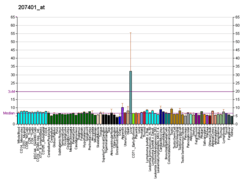PROX1
Prospero homeobox protein 1 is a protein that in humans is encoded by the PROX1 gene.[5][6]
Production
PROX1 is produced primarily in the dentate gyrus in the mouse, and in the dentate gyrus and white matter in humans. Gene expression data for mouse, human and macaque from the Allen Brain Atlases can be found here.
Clinical significance
PROX1 is used as a marker for lymphatic endothelium in biopsy samples.
gollark: I WILL be candidate. There is no escape.
gollark: pig undergo immediate apification
gollark: This REALLY should not be required and I don't know why it is.
gollark: ++magic reload_ext irc_link
gollark: It seems to be a server/power/network failure.
References
- GRCh38: Ensembl release 89: ENSG00000117707 - Ensembl, May 2017
- GRCm38: Ensembl release 89: ENSMUSG00000010175 - Ensembl, May 2017
- "Human PubMed Reference:". National Center for Biotechnology Information, U.S. National Library of Medicine.
- "Mouse PubMed Reference:". National Center for Biotechnology Information, U.S. National Library of Medicine.
- Zinovieva RD, Duncan MK, Johnson TR, Torres R, Polymeropoulos MH, Tomarev SI (Dec 1996). "Structure and chromosomal localization of the human homeobox gene Prox 1". Genomics. 35 (3): 517–22. doi:10.1006/geno.1996.0392. PMID 8812486.
- "Entrez Gene: PROX1 prospero-related homeobox 1".
- Chen, Qin; Dowhan Dennis H; Liang Dongcai; Moore David D; Overbeek Paul A (Jul 2002). "CREB-binding protein/p300 co-activation of crystallin gene expression". J. Biol. Chem. United States. 277 (27): 24081–9. doi:10.1074/jbc.M201821200. ISSN 0021-9258. PMID 11943779.
Further reading
- Wigle JT, Chowdhury K, Gruss P, Oliver G (1999). "Prox1 function is crucial for mouse lens-fibre elongation". Nat. Genet. 21 (3): 318–22. doi:10.1038/6844. PMID 10080188.
- Mouta Carreira C, Nasser SM, di Tomaso E, et al. (2001). "LYVE-1 is not restricted to the lymph vessels: expression in normal liver blood sinusoids and down-regulation in human liver cancer and cirrhosis". Cancer Res. 61 (22): 8079–84. PMID 11719431.
- Rodriguez-Niedenführ M, Papoutsi M, Christ B, et al. (2002). "Prox1 is a marker of ectodermal placodes, endodermal compartments, lymphatic endothelium and lymphangioblasts". Anat. Embryol. 204 (5): 399–406. doi:10.1007/s00429-001-0214-9. PMID 11789987.
- Duncan MK, Cui W, Oh DJ, Tomarev SI (2002). "Prox1 is differentially localized during lens development". Mech. Dev. 112 (1–2): 195–8. doi:10.1016/S0925-4773(01)00645-1. PMID 11850194.
- Chen Q, Dowhan DH, Liang D, et al. (2002). "CREB-binding protein/p300 co-activation of crystallin gene expression". J. Biol. Chem. 277 (27): 24081–9. doi:10.1074/jbc.M201821200. PMID 11943779.
- Wilting J, Papoutsi M, Christ B, et al. (2002). "The transcription factor Prox1 is a marker for lymphatic endothelial cells in normal and diseased human tissues". FASEB J. 16 (10): 1271–3. doi:10.1096/fj.01-1010fje. PMID 12060670.
- Petrova TV, Mäkinen T, Mäkelä TP, et al. (2002). "Lymphatic endothelial reprogramming of vascular endothelial cells by the Prox-1 homeobox transcription factor". EMBO J. 21 (17): 4593–9. doi:10.1093/emboj/cdf470. PMC 125413. PMID 12198161.
- Hong YK, Harvey N, Noh YH, et al. (2003). "Prox1 is a master control gene in the program specifying lymphatic endothelial cell fate". Dev. Dyn. 225 (3): 351–7. doi:10.1002/dvdy.10163. PMID 12412020.
- Strausberg RL, Feingold EA, Grouse LH, et al. (2003). "Generation and initial analysis of more than 15,000 full-length human and mouse cDNA sequences". Proc. Natl. Acad. Sci. U.S.A. 99 (26): 16899–903. Bibcode:2002PNAS...9916899M. doi:10.1073/pnas.242603899. PMC 139241. PMID 12477932.
- Dyer MA, Livesey FJ, Cepko CL, Oliver G (2003). "Prox1 function controls progenitor cell proliferation and horizontal cell genesis in the mammalian retina". Nat. Genet. 34 (1): 53–8. doi:10.1038/ng1144. PMID 12692551.
- Nagai H, Li Y, Hatano S, et al. (2003). "Mutations and aberrant DNA methylation of the PROX1 gene in hematologic malignancies". Genes Chromosomes Cancer. 38 (1): 13–21. doi:10.1002/gcc.10248. PMID 12874782.
- Steffensen KR, Holter E, Båvner A, et al. (2005). "Functional conservation of interactions between a homeodomain cofactor and a mammalian FTZ-F1 homologue". EMBO Rep. 5 (6): 613–9. doi:10.1038/sj.embor.7400147. PMC 1299067. PMID 15143342.
- Qin J, Gao DM, Jiang QF, et al. (2005). "Prospero-related homeobox (Prox1) is a corepressor of human liver receptor homolog-1 and suppresses the transcription of the cholesterol 7-alpha-hydroxylase gene". Mol. Endocrinol. 18 (10): 2424–39. doi:10.1210/me.2004-0009. PMID 15205472.
- Dudas J, Papoutsi M, Hecht M, et al. (2005). "The homeobox transcription factor Prox1 is highly conserved in embryonic hepatoblasts and in adult and transformed hepatocytes, but is absent from bile duct epithelium". Anat. Embryol. 208 (5): 359–66. doi:10.1007/s00429-004-0403-4. PMID 15232737.
- Reis RM, Reis-Filho JS, Longatto Filho A, et al. (2006). "Differential Prox-1 and CD 31 expression in mucousae, cutaneous and soft tissue vascular lesions and tumors". Pathol. Res. Pract. 201 (12): 771–6. doi:10.1016/j.prp.2005.08.010. hdl:1822/5789. PMID 16308102.
- Song KH, Li T, Chiang JY (2006). "A prospero-related homeodomain protein is a novel co-regulator of hepatocyte nuclear factor 4 α that regulates the cholesterol 7α-hydroxylase gene". J. Biol. Chem. 281 (15): 10081–8. doi:10.1074/jbc.M513420200. PMC 1785292. PMID 16488887.
- Schneider M, Büchler P, Giese N, et al. (2006). "Role of lymphangiogenesis and lymphangiogenic factors during pancreatic cancer progression and lymphatic spread". Int. J. Oncol. 28 (4): 883–90. doi:10.3892/ijo.28.4.883. PMID 16525637.
- Shimoda M, Takahashi M, Yoshimoto T, et al. (2006). "A homeobox protein, prox1, is involved in the differentiation, proliferation, and prognosis in hepatocellular carcinoma". Clin. Cancer Res. 12 (20 Pt 1): 6005–11. doi:10.1158/1078-0432.CCR-06-0712. hdl:2433/135812. PMID 17062673.
- Laerm A, Helmbold P, Goldberg M, et al. (2007). "Prospero-related homeobox 1 (PROX1) is frequently inactivated by genomic deletions and epigenetic silencing in carcinomas of the bilary system". J. Hepatol. 46 (1): 89–97. doi:10.1016/j.jhep.2006.07.033. PMID 17069925.
External links
- PROX1+protein,+human at the US National Library of Medicine Medical Subject Headings (MeSH)
- Overview of all the structural information available in the PDB for UniProt: Q92786 (Prospero homeobox protein 1) at the PDBe-KB.
This article incorporates text from the United States National Library of Medicine, which is in the public domain.
This article is issued from Wikipedia. The text is licensed under Creative Commons - Attribution - Sharealike. Additional terms may apply for the media files.




